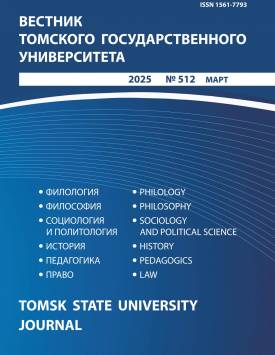On the balance of rights and responsibilities as a new foundation for the welfare state
The article discusses the new constitutional provisions enshrined in Article 75.1, which represent a new set of principles for the welfare state during Russia's current period of development. It focuses on norms related to the balance between rights and responsibilities, economic, political, and social solidarity, as well as the constitutionalization of social partnerships. These provisions aim to serve as tools and foundations for changing legal regulations regarding the relationship between constitutional rights and obligations. In this study, the author specifically examines the conditions for realizing the right to work, while also fulfilling constitutional duties related to caring for children, raising them, and ensuring their access to basic general education. The aim is to explore the content of these constitutional principles in light of the positions taken by the Constitutional Court of Russia. The use of the comparative legal method allowed the author to draw a correlation between the practices of using and implementing the constitutional principles underpinning the social policies of Ireland, Italy, Germany, and Russia. The author concluded that the Constitutional Court of the Russian Federation, by formulating legal positions in relation to the provision of Article 75.1 of the Constitution, tends to prioritize the general functioning of the constitutional system, which consists of rights and principles. Its decisions are intended to produce the desired effects. At the same time, values and principles are not to be stigmatized but rather to be seen as integral and flexible constitutional provisions open to interpretation by judges and lawmakers. The general content of the principle of balanced rights and freedoms guides not only the Constitutional Court, but also the legislator in reviewing labor standards. This principle takes into account the need to establish a balance between socio-economic rights and constitutional obligations. The legal formal method allows the author to compare the conditions for realizing the right to work with the fulfillment of the constitutional obligation to care for children and their upbringing. The content of this constitutional duty is extensive and energy-intensive, requiring free time. This creates a situation where, all other things being equal, employees without minor children have more freedom in disposing of their leisure time than those with minor children. As a result of the study, conclusions are drawn about the need to change the legal regulations regarding working hours and rest time for employees with family responsibilities. To find a balance between the rights of employees with and without minor children, it is proposed to use social partnership mechanisms to legitimize this change. The authors declare no conflicts of interests.
Keywords
balance of rights and duties, social partnership, right to work, duty to take care of childrenAuthors
| Name | Organization | |
| Makartseva (Razdyakonova) Evgeniya V. | Siberian Institute of Management - branch of the Russian Presidential Academy of National Economy and Public Administration | evr505@yandex.ru |
References

On the balance of rights and responsibilities as a new foundation for the welfare state | Vestnik Tomskogo gosudarstvennogo universiteta – Tomsk State University Journal. 2025. № 512. DOI: 10.17223/15617793/512/28
